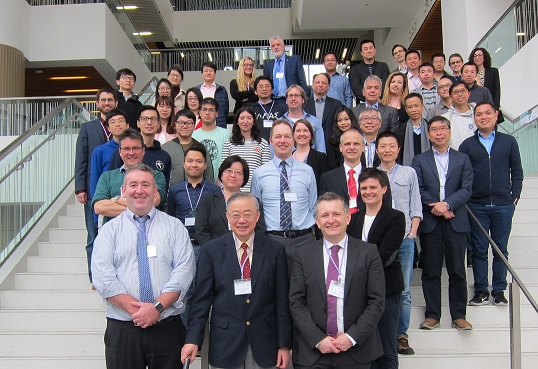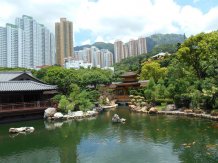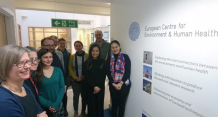Current ENSURE activities
CUHK, the University of Queensland and the University of Exeter Hold International Workshop on Environmental Sustainability and Resilience

The Chinese University of Hong Kong (CUHK) – University of Exeter Joint Centre for Environmental Sustainability and Resilience (ENSURE) held an international workshop on urgent issues confronting environmental sustainability and human health from 25 to 26 February 2019 in Hong Kong.
The workshop brought together 40 multi-disciplinary researchers, including researchers from the University of Queensland. It was co-chaired by the Co-Directors of ENSURE – Professor Gabriel Lau, Co-Director of the Institute of Environment, Energy and Sustainability (IEES) at CUHK and Professor Gavin Shaddick, the Chair of Data Science and Statistics and Head of the Department of Mathematics at the University of Exeter. The participants reviewed collaborative projects currently in progress, and discussed new avenues of joint research and funding opportunities in the future. There was discussion of opportunities for postgraduate student exchange and training through Exeter’s new Centre for Doctoral Training in Environmental Intelligence: Data Science and Artificial Intelligence for Sustainable Futures, which will involve 50 PhD studentships commencing in the next five years.
Current ENSURE projects relate to such issues as atmospheric pollution, global food security and the sustainability of coastal megalopolises in China’s Greater Bay Area. The workshop also covered issues relating to carbon capture and storage, regulatory aspects of carbon emissions, and green technology.
Professor Gabriel Lau said, “Climate change is one of the most pressing environmental issues facing our society today. It affects food supply, availability of water resources and air quality. Tackling these global environmental concerns requires complementary expertise from diverse disciplines and sectors. This international workshop brought together a group of top international scholars from different research fields, enhancing cooperation between our universities while endeavouring for global sustainable development.”
Professor Gavin Shaddick added, “Environmental intelligence, the use of artificial intelligence to extract meaningful insights from various environmental data sources, will facilitate researchers to understand the complex environmental challenges and identify potential solutions. The collaborative research and development efforts through ENSURE is cultivating next-generation talents equipped with new skills for future solutions.”
Hong Kong’s waters benefit health and wellbeing

Nan Lian Garden, Kowloon, Hong Kong (2017)
A ground-breaking study has revealed how spending time in and around Hong Kong’s ‘blue spaces’ (harbours, coastlines and beaches) is linked to better health and wellbeing, especially for older adults.
The team found that local residents with a view of the water from their home reported better health. Meanwhile, those who regularly visit such environments in their free time reported higher wellbeing and had a lower risk of depression.
The study, published in Health and Place, is believed to be the first of its kind to be conducted in Asia, and in a city as large as Hong Kong anywhere in the world. The research is the result of a collaboration between the Chinese University of Hong Kong (CUHK) and the University of Exeter in the UK, as part of the Joint Centre for Environmental Sustainability and Resilience (ENSURE).
Lead CUHK researcher Professor Martin Wong and his team surveyed 1,000 people visiting a cancer screening centre linked to the Jockey Club School of Public Health and Primary Care. The nature of the screening meant that 80 per cent of respondents were aged over 50. They asked participants questions about their contact with the sea and other water bodies, as well as their health and wellbeing.
Dr Jo Garrett, from the University of Exeter, said: “Our evidence suggests that Hong Kong’s harbours, beaches and other natural blue spaces could be an important public health resource, at least for older residents. We found that people with a view of these environments reported better health, while those who visited regularly reported better wellbeing. We can’t yet say that the contact with blue spaces caused this improvement – however we accounted for factors such as income and age, so we’re confident in our results.”
The researchers found that people were more likely to visit Hong Kong’s blue spaces if they lived within a 10-15 minute walk and felt there were good facilities and wildlife to see. Visiting for at least an hour or more, and engaging in higher-intensity activities while there, were also linked to higher wellbeing.
CUHK’s Professor Martin Wong, concluded: “This study contributes to a growing body of evidence worldwide suggesting that contact with blue spaces benefits human health and wellbeing. The study could help shape preservation efforts, and future programmes to encourage people to optimise the potential benefits of experiencing their natural water environments, both here in Hong Kong and globally. We’re now engaged in research with our Exeter colleagues to see if these findings are replicated globally.”
The paper, entitled ‘Urban blue space and health and wellbeing in Hong Kong: Results from a survey of older adults’ is published in Health and Place.
Gavin Shaddick, Professor of Data Science and Statistics, University of Exeter featured in BBC Radio 4's 'The Briefing Room'
.jpg)
Listen here.
Meeting with University of Exeter European Centre for Environment & Human Health

Professor Emily Chan and Dr Holly Lam of CCOUC participated in a meeting with researchers from the European Centre for Environment & Human Health (ECEHH), University of Exeter Medical School at Truro, UK on 6 February 2018 to discuss the Environmental Sustainability and Resilience (ENSURE) project. The meeting aimed to get an understanding of the ECEHH team‘s structure and study interests, and to explore the potential projects and collaborations under the ENSURE project on behalf of CUHK. The ENSURE project will be a series of research projects and collaboration between the University of Exeter and CUHK under the theme of “climate change and health”.
